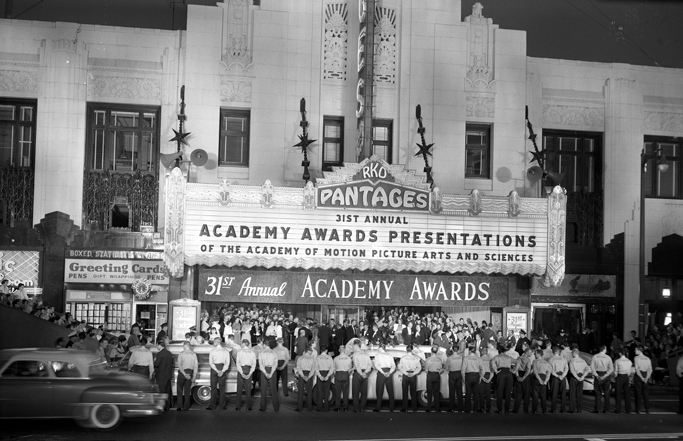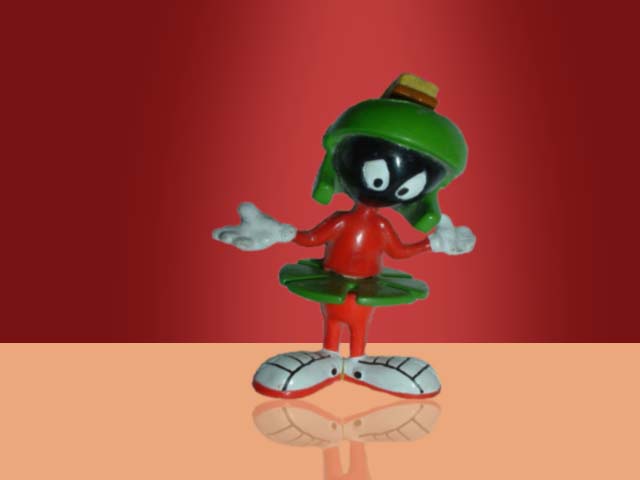With the Academy Awards just a few days away, we’ve had movies and movie words on the mind. What better way to celebrate than with this special Word Soup dedicated to film slang and lingo?
Abby Singer
“‘Abby Singer’ is director slang for the ‘next to the last shot,’ and takes its name from an assistant director, according to DGA Magazine.”
Joyce Wadler, “Where’s John Ford When You Need Him?” The New York Times, February 2, 2005
The Abby Singer was named for Abner E. “Abby” Singer, a production manager and assistant director. When asked how many shots were left at the end of the day, Singer would always answer, “This, and one more.”
Alan Smithee
“’Alan Smithee‘ is a phony name that turns up whenever a director is so embarrassed by what’s been done to his movie that he takes his name off it.”
John Hartl, “Credit Alan Smithee for ‘Hellraiser’ Fiasco,” Pittsburgh Post-Gazette, March 12, 1996
Alan Smithee – which some say is an anagram for “the alias men” – was first used for the 1969 film Death of a Gunfighter.
biopic
“A spot for Listerine, sold by Johnson & Johnson, urged viewers to ‘fight biofilm.’ That may have generated a lot of head-scratching in Hollywood, where a movie about a real person is called a ‘biopic.’”
Stuart Elliott, “Commercials at the Oscars Play It Safe and Play It Again,” The New York Times, February 28, 2011
A biopic, a blend of biography and picture, is a “a film or television biography, often with fictionalized episodes.” The word seems to have been coined by writers at Variety magazine.
blaxploitation
“For every heroine in the canon of blaxploitation movies — often filmed with her breasts popping out if her shirt at random intervals for no good reason at all — Pam Grier redeems every shirtless character she ever played in this film about a double-cross gone awry.”
Jim Izrael, “Girls, Guns and Grudges,” NPR: Tell Me More, August 28, 2011
Blaxploitation films are “a genre of American film of the 1970s featuring African-American actors in lead roles and often having antiestablishment plots, frequently criticized for stereotypical characterization and glorification of violence.” Blaxploitation is a blend of black and exploitation.
Bollywood
“The influence of Bollywood suffuses every scene of ‘Slumdog Millionaire,’ as well as Hollywood-financed diversions as various as ‘Moulin Rouge’ and ‘You Don’t Mess With the Zohan.’”
Michael Phillips, “Bollywood hybrid fails to fly,” Chicago Tribune, January 16, 2009
Bollywood refers to “the Indian film industry located in Mumbai,” and is a blend Bombay, the former name of Mumbai, and Hollywood. The word Bollywood, which may have originated in the 1970s, was inspired by an earlier blend, Tollywood, “referring to the Bengali film industry based in Tollygunge,” and dating back to 1932.
box office poison
“Nation-wide attention was directed to a statement signed by the Independent Theater Owners’ Association, which came right out in print and characterized Mae West, Greta Garbo, Joan Crawford, Katharine Hepburn, Kay Francis and Marlene Diectrich ‘as box office poison.’”
Paul Harrison, “‘Box Office Poison’ Blast Fails to Disturb Movie Moguls Trying to Cut Stars’ Salaries,” The Pittsburgh Press, May 10, 1938
The infamous “box office poison” letter was written by Harry Brandt, president of the Independent Theater Owners’ Association. Brandt tempered his statement by saying that the actors’ “dramatic ability is unquestioned but [their] box-office draw is nil.”
chew the scenery
“Combs also has a ball as over-the-top Sergio, not so much chewing the scenery as swallowing it whole.”
Martin Morrow, “Review: Get Him to the Greek,” CBC News, June 4, 2010
To chew the scenery means to overact. According to World Wide Words, the phrase is sometimes meant as a compliment, “suggesting an actor who is energetic and spirited,” and may have originated around 1891, referring first to stage actors, “which is only reasonable. . .since scenery that is close enough to you that you can chew on it, even figuratively, is usually found only on the stage.”
chick flick
“At the very least, the film [The Devil Wears Prada] is laboriously designed as a chick flick in which the male species is clearly subordinated to the female.”
“The Devil Is a Dominatrix, But Streep’s No Real Surprise,” New York Observer, July 17, 2006
A chick flick is “usually about romances, which is popular with females and comparatively unpopular with males.” Chick is slang for a girl or young woman, and first recorded in 1927, while flick is slang for a movie, first attested from 1926 as a back formation of flicker, from the flickering appearance of film at the time.
The term chick flick seems to have originated in the early 1990s, referring to films such as Thelma & Louise and Sleepless in Seattle.
chopsocky
“In the 1970s and 1980s, a blizzard of ‘chopsocky’ TV shows and films, such as the 1982 Jet Li film ‘Shaolin Temple,’ helped to sear the Buddhist legends into the popular imagination, both in China and abroad.”
Geoffrey A. Fowlers and Juliet Ye, “Kung Fu Monks Don’t Get a Kick Out of Fighting,” The Wall Street Journal, December 14, 2007
Chopsocky refers to “a genre of exaggerated martial arts films made primarily in Hong Kong and Taiwan during the 1960s and 1970s.” The term was coined by writer David J. Fox at Variety magazine, and may be a blend of chop suey, “a mixed dish served in Chinese restaurants in New York and elsewhere, as a Chinese dish (but apparently not known in China),” and sock, “to hit hard.”
cowboy shot
“If a ‘D.P’ – that’s director of photography – calls for ‘a cowboy shot,’ he may not necessarily be working on a Western. ‘When cowboys duel on a Western street, where do they go for their guns? Their holsters. So you have to photograph down almost to their knees. That’s why we call it a cowboy shot,’ he says.”
Bob Thomas, “Sound stage slang,” Sun Journal, October 31, 2005
In Europe, a cowboy shot is known as a plán americain or plano americano.
Dogme 95
“Almost a decade ago, Danish director Lars von Trier co-founded the Dogme 95 movement, which produced an ‘indisputable set of rules’ for filmmakers called ‘The Vow of Chastity.’ Among its ten commandments: ‘Shooting must be done on location’; ‘The sound must never be produced apart from the images or vice versa’; ‘The camera must be hand-held’; ‘Special lighting is not acceptable.’”
Christopher Orr, “The Move Review: ‘Dogville,’” The Atlantic, August 24, 2004
Dogme 95 was founded in 1995. Dogme is the Danish word for dogma, “authoritative teaching or doctrine; a system of established principles or tenets.”
fake Shemp
“As well as having Campbell in the lead, this particular effort was written, directed and produced by one Josh Becker who had served as second unit lighting technician and sound man on The Evil Dead and who would go an to collaborate with Raimi and Tapert on a number of occasions. He was a ‘fake shemp’ in Evil Dead II, for example, whilst he has also directed one of the Hercules pilot movies and an episode of Xena.”
Anthony Nield, “The Evil Dead,” The Digital Fix, October 5, 2005
Fake Shemp is “the term for someone who appears in a film under heavy make-up, filmed from the back, or perhaps only showing an arm or a foot.” The term was named for The Three Stooges’ Shemp Howard, who died suddenly. Shemp’s stand-in was used “appearing only from behind or with an object obscuring his face.”
grindhouse
“Grindhouses, which got their name from the bump-and-grind stripteases they featured in their previous life as burlesque houses, were seedy, rundown movie theatres in the 1970s where low-budget exploitation films titillated undiscriminating audiences with sex and violence.”
Warren Clements, “Here’s to the grindhouse – in all its nasty, loopy glory,” The Globe and Mail, October 7, 2010
The advent in the 1980s of home video and cable TV threatened to make grindhouses obsolete.
it girl
“Clara Bow, still showing the flash of beauty she displayed as the ‘It Girl’ of Hollywood’s flaming past, emerged from self-imposed obscurity Monday to bury her husband of 30 years, Lieut. Gov. Rex Bell of Nevada.”
“Clara Bow, ‘It Girl’ of Movies, Beautiful at Husband’s Funeral,” St. Joseph Gazette, July 10, 1962
It girl is “a term for a young woman who possesses the quality ‘It’,” or an attractive quality difficult to describe or express. The term was coined either by Rudyard Kipling around 1904 or British novelist and scripwriter, Elinor Glyn, in her 1927 film It, which starred Clara Bow, who afterward became known as the It Girl.
J-horror
“Arguably the greatest film of the so-called J-horror wave of the late ’90s and early 2000s, Kiyoshi Kurosawa’s ‘Pulse’ brought the current of apocalyptic dread that runs through Japanese pop culture into the Internet age with a vengeance.”
Andrew O’Hehir, “Japan’s cinema of disaster, from Godzilla to J-horror,” Salon, March 15, 2011
J-horror refers to the genre of Japanese horror films that tend “to focus on psychological horror and tension building.” Although such films gained popularity in the 1990s, the term seems to have originated in the early 2000s. The earliest citation we found was from The New York Times: “[Director Hideo Nakata] is credited as one of the creators of a new, scarier, psychological horror genre known as J-horror, with less splatter and a lot more dread.”
J-horror may be a play on an earlier term, J-pop, coined in the 1990s and referring to popular, non-traditional, Japanese music.
Kubrick stare
“[The Shining] also has what Roger Ebert describes as The Kubrick Stare, with a character – in this case Torrance – staring into camera as he goes mad, with his head down and his eyes looking up.”
James White, “7 Respected Directors Who Did Horror,” Total Film, July 3, 2009
The Kubrick stare refers to director Stanley Kubrick. In Vincent LoBrutto’s 1999 biography of Kubrick, the stare is referred to as the Kubrick crazy stare. Kubrick’s cinematographer Douglas Milsome said that in Full Metal Jacket, Vincent D’Onofrio “flashes what people are now referring to as the ‘Kubrick crazy stare.’ Stanley has a stare like that which is very penetrating and frightens the hell out of you sometimes.”
MacGuffin
“But the microfilm that the bad guys are smuggling out of the country — that’s just what Hitchcock called the MacGuffin, the pretense for the movie, the silly excuse upon which he pinned his real story: a man is mistaken for another man and nearly murdered because of this mistake.”
“The Mother of All Horror Films,” Newsweek, January 6, 2010
World Wide Words says the first recorded usage of MacGuffin was by Alfred Hitchcock in 1939, who described it as “the mechanical element that usually crops up in any story.” However, the origin of the term is obscure.
magical Negro
“Perhaps it’s time for the ‘magical negro’ to retire. Just in recent years, this mythical figure has come to the aid of a number of cinema’s troubled whites: a golfer (The Legend of Bagger Vance), a shallow executive (The Family Man), an uptight attorney (Bringing Down the House), and The One (The Matrix-es).”
Tricia Olszewski, “Film Review: Black Snake Moan,” Washington City Paper, March 2, 2007
The term magical Negro was coined by director Spike Lee in a 2001 speech at Washington State University, in which he expressed disgust with “a recent trend toward characters he called ‘the super-duper, magical Negro,'” characters who “have amazing powers that benefit white people, but not blacks,” similar to “the age-old image of the slave who loves slavery.”
manic pixie dream girl
“Who’s just as cute as a button? Who’s the most deliciously delirious young woman, always up to her false eyelashes in madcap romps? It’s the Manic Pixie Dream Girl, of course.”
Neda Ulaby, “Manic Pixie Dream Girls: A Cinematic Scourge?” NPR, October 9, 2008
The term manic pixie dream girl was coined by film critic Nathan Rabin in 2007 regarding Kirsten Dunst’s character in the film Elizabethtown, “that bubbly, shallow cinematic creature that exists solely in the fevered imaginations of sensitive writer-directors to teach broodingly soulful young men to embrace life and its infinite mysteries and adventures.”
martini shot
“I stuck around after even after I wrapped to see the martini shot of the entire show. I could feel director Jack Bender’s resistance to call ‘print’ on that last take. In fact I’m pretty sure he asked for one more take to delay the inevitable.”
Eric Ditzian, “’Lost’ Star Jorge Garcia Pens Farewell To The Island,” MTV.com, March 21, 2010
A martini shot refers to the last shot of the day. According to Dave Knox, author of Strike the Baby and Kill the Blonde: An Insider’s Guide to Film Slang, “The last [shot] is a martini because the next shot is out of glass.”
mockbuster
“The ‘mockbuster’ is a film based on the story of a big blockbuster movie, which is cheaper, shorter and is usually released straight-to-DVD long before the original is anywhere close to coming out in the shops.”
Fiona Pryor, “Spoofing the big film blockbuster,” BBC News, May 17, 2010
Mockbuster is a blend of mock and blockbuster, a film “that sustains widespread popularity and achieves enormous sales.” It’s also known as a knockbuster, a blend of knockoff, an unauthorized imitation, often poorly-made, and blockbuster.
mockumentary
“What Reiner did not foresee was that in its 25-year existence, ‘Spinal Tap’ has influenced both the way we tell stories—Michael Schur, creator of ‘The Office,’ recently said the mockumentary is his preferred storytelling format—and the way we understand them.”
Jennie Yabroff, “The Real Spinal Tap,” Newsweek, April 10, 2009
Mockumentary is a blend of mock and documentary. As for first use, while the OED notes appearances of the word in 1965, the word may have gained popularity with the 1984 film, This is Spinal Tap.
nuke the fridge
“The story isn’t going to set the world on fire, but ‘Tintin’ is still a hell of a lot more entertaining than 2008′s ‘Indiana Jones and the Kingdom of the Crystal Skull,’ a movie so miscalculated it inspired a new variation on ‘jumping the shark.’ Now the moment when franchises officially run out of good ideas, they ‘nuke the fridge.’”
Matt Singer, “Indiana Jones and the razor-sharp criticism,” IFC.com, December 26, 2011
The term nuke the fridge was coined in 2008 “in the wake of ‘Indiana Jones the Kingdom of the Crystal Skull,’ in which Indy survives an atomic bomb blast by hiding in a refrigerator.”
oater
“The craggy, mellowing Eastwood directs himself admirably in this scenic, first-class oater [The Unforgiven], which strikes an ideal balance between character piece and action film as it portrays a rapidly changing way of life.”
John Farr, “The Hard-Won Legacy of Gene Hackman,” The Huffington Post, March 21, 2010
An oater is “a movie about frontier or cowboy life; a western,” and is named for “the prominence of horses, known for their taste for oats, in such films.” The term originated in 1946. See also horse opera.
Oscar
“The golden guy known to the world as the Oscar, the real star of Sunday’s Academy Awards, has become a Hollywood icon over the past 82 years, but the origin of his name has been lost in time.”
“Oscar: Hollywood’s golden mystery man,” The Independent, March 2, 2010
The Oscar is “a statuette awarded by the Academy of Motion Picture Arts and Sciences,” first awarded in 1929, and not named Oscar till the early 1930s. According to Andy Bowers, there are multiple claims to the origin, including actress Bette Davis remarking on the resemblance between the statue’s behind and her first husband’s, Harman Oscar Nelson; columnist Sidney Skolsky referring to an old vaudeville line, “Will you have a cigar, Oscar?”; and Academy librarian Maragret Herrick noting the small gold man bore a resemblance to her uncle Oscar.
quota quickies
“The standard histories maintain that there wasn’t much worth seeing [in prewar British cinema]: this was, after all, the era of the ‘quota quickie,’ cheap little movies made solely to fulfill the demands of the 1927 Cinematographic Film Act, which required that 5 percent of the movies on British screens actually be British.”
Dave Kehr, “New DVDs: Early British Cinema,” The New York Times, September 29, 2008
Quota quickies may be likened to B-movies, low budget movies with poor production values.
romcom
“Most romcoms attempting that delay tactic instead give us screaming matches, ridiculous misunderstandings and other exasperating nonsense that bring us to the brink of loathing.”
Jennie Punter, “Just Wright: The right mix for a slamdunk romcom,” The Globe and Mail, May 14, 2010
Romcom is a blend of romantic comedy, “films with light-hearted, humorous plotlines, centered on romantic ideals such as that true love is able to surmount most obstacles.” The term romcom seems to have originated in the late 1990s regarding films such as You’ve Got Mail and One Fine Day.
sexploitation
“The cinema’s biggest hits were underground classics such as Thundercrack and Cafe Flesh; John Waters’s 70s trash trilogy Pink Flamingos, Female Trouble and Desperate Living; and the work of sexploitation king Russ Meyer.”
Tony Paley, “Cinema of sin: London’s old Scala picturehouse,” The Guardian, July 31, 2011
Sexploitation is a portmanteau of sex and exploitation, and refers to “exploitative use of explicit sexual material in movies.” It attests to 1942.
spaghetti western
“Sergio Leone, the Italian director who gave class to the term ‘spaghetti western,’ has made some weird movies in his day but nothing to match ‘Once Upon a Time in America,’ a lazily haullucinatory epic that means to encapsulate approximately 50 years of American social history into a single film.”
Vincent Canby, “Movie Review: Once Upon a Time in America,” The New York Times, June 1, 1984
A spaghetti western is a “a low-budget Western movie produced by a European (especially an Italian) film company.” The term originated in 1969.
Spielberg face, the
“‘Nowadays, it seems you can’t have a spectacular special effects action sequence without a Spielberg face to cue you to be in awe,’ Mr. Lee writes.”
Melena Ryzik, “Staring in Awe? It’s ‘the Spielberg Face,'” The New York Times, December 19, 2011
The Spielberg face, which refers to director Steven Spielberg, was coined last year by Kevin B. Lee who compiled a video essay of these close-up shots of actors with “eyes open, staring in wordless wonder in a moment where time stands still,” a look that “has come to be shorthand for a cinematic discovery on the part of the characters and the audience.”
Wilhelm scream
“A single scream, recorded for the 1951 film ‘Distant Drums,’ has made its way into dozens of films, games and TV shows. Afficianados call it the ‘Wilhelm Scream’ and have cataloged many of the films in which it appeared, from Hercules to Pirates of the Caribbean, The X-Files to the short ‘Golden Dreams’ film at Disney California Adventure.”
Cory Doctorow, “Wilhelm Scream – Hollywood’s favorite scream,” Boing Boing, November 29, 2006
The Wilhelm scream was created by sound designer Ben Burtt in 1977, “which he called ‘Wilhelm’ after the character that let out the scream in ‘Charge at Feather River.’”
wuxia
“Through martial arts practice the Wuxia hero becomes, in effect, superhuman. Lightning-fast reflexes allow for the ‘zhao’ fighting style, turning everyday objects into lethal weapons, whether thrown or wielded. Opponents can be paralysed with a single accurate blow or avoided by scaling walls or through the power of flight.”
“House of Flying Daggers,” Spiked, December 23, 2004
Wuxia, which is Chinese in origin, also refers to literature, Chinese opera, and video games. Wu translates as “martial, military, armed,” while xia translates as “honorable, chivalrous, hero.”
This list is far from complete! What are some of your favorite movie words?



